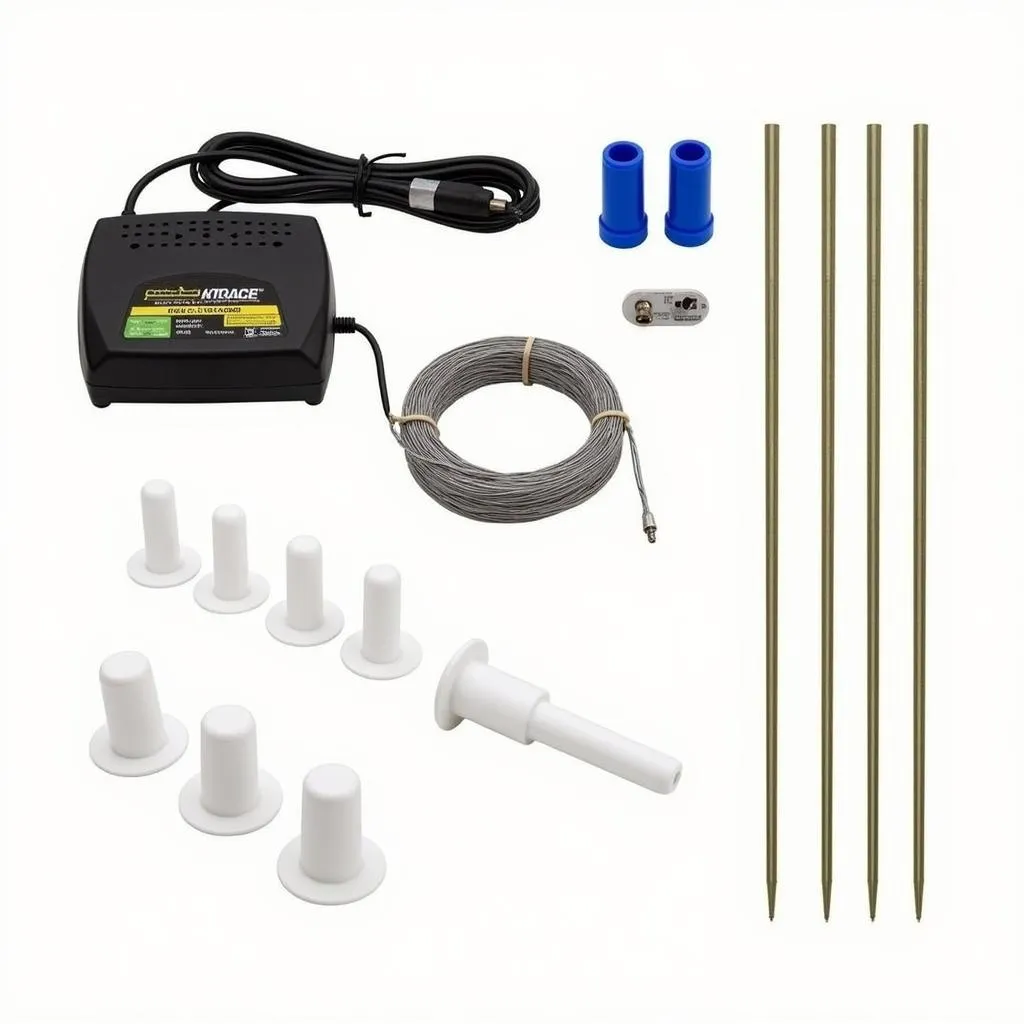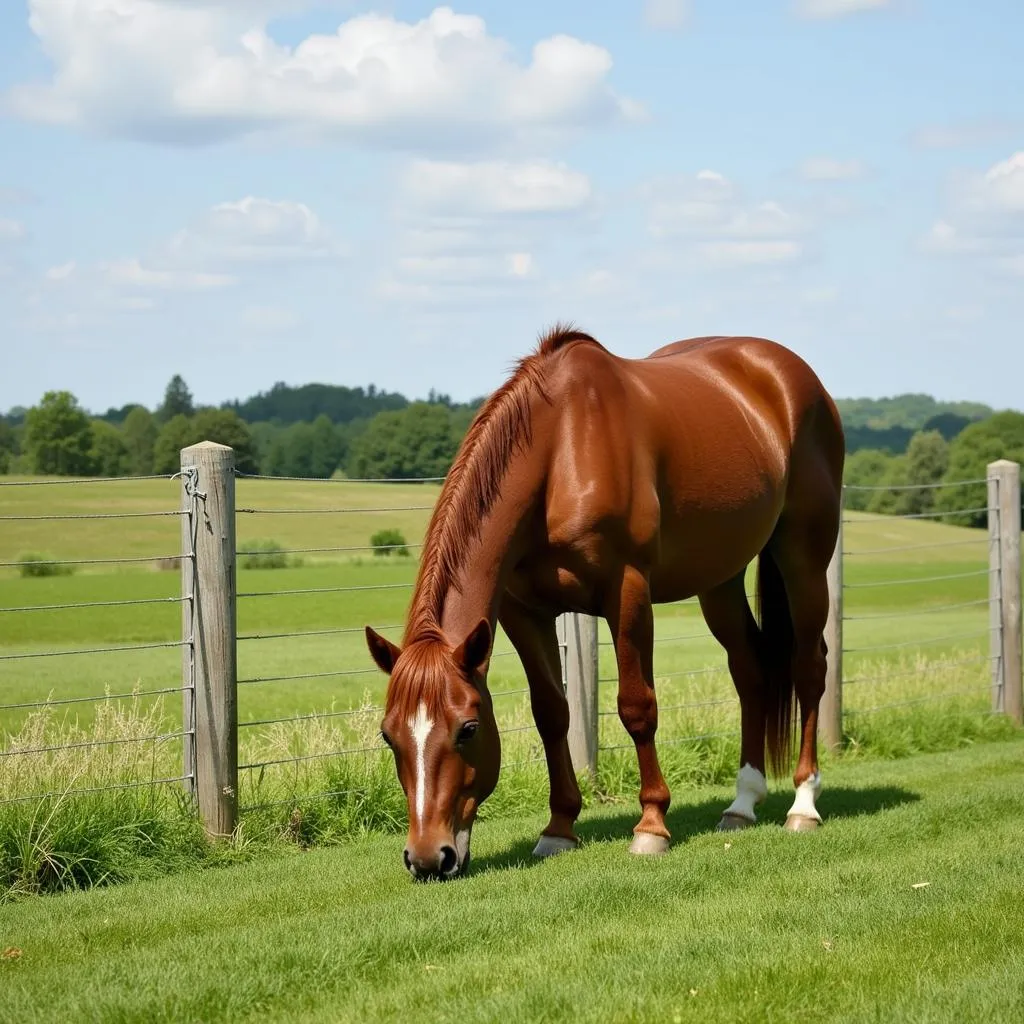Electric fence kits for horses are a popular choice for horse owners looking for a safe and effective way to contain their animals. They offer a visible and psychological barrier that keeps horses safely within a designated area, while also deterring potential predators. However, choosing the right electric fence kit and installing it correctly can be daunting. This comprehensive guide will equip you with all the information you need to make an informed decision and ensure your horse’s safety.
 Electric Fence Kit Components
Electric Fence Kit Components
Understanding the Basics of Electric Fences for Horses
Electric fences for horses work by delivering a short, sharp, but safe pulse of electricity when touched. This mild shock acts as a deterrent, teaching horses to avoid contact with the fence. Contrary to common misconceptions, electric fences are humane and do not cause any lasting harm.
Choosing the Right Electric Fence Kit for Horses
Selecting the appropriate electric fence kit is crucial for its effectiveness and your horse’s well-being. Here are key factors to consider:
Fence Line Length and Layout:
Accurately measure the total length of the perimeter you intend to fence to determine the required amount of wire, tape, or rope. Consider the terrain and shape of your pasture, accounting for any obstacles that require deviation in the fence line.
Power Source:
Electric fence energizers are available in various power options:
- Mains Powered: Ideal for long fence lines or areas with a reliable power source.
- Battery Powered: Suitable for shorter fences or areas without access to electricity, often requiring periodic battery replacement.
- Solar Powered: An environmentally friendly and cost-effective option for areas with ample sunlight, though effectiveness may fluctuate depending on weather conditions.
Fence Wire, Tape, or Rope:
The choice of conductor depends on visibility requirements and the power of your energizer:
- Wire: Offers excellent conductivity but is less visible, potentially increasing the risk of horses running into the fence.
- Tape: More visible than wire, reducing the chance of accidental contact, but it can be more susceptible to wind resistance and damage.
- Rope: Combines good conductivity with visibility, often containing multiple strands of conductive material for enhanced conductivity.
Fence Posts and Insulators:
Selecting durable and appropriate fence posts and insulators is vital for maintaining fence integrity:
- Fence Posts: Choose from wood, plastic, or metal posts depending on your budget, aesthetic preferences, and soil type.
- Insulators: Use insulators specifically designed for electric fencing to prevent energy leakage and ensure the current flows effectively through the fence.
Grounding:
Proper grounding is paramount for the fence’s safety and functionality. Use grounding rods specifically designed for electric fencing and ensure they are installed deep enough to provide a solid connection to the earth.
 Horse Grazing Near an Electric Fence
Horse Grazing Near an Electric Fence
Installation and Safety Tips
Once you have selected the right electric fence kit, proper installation is crucial for its effectiveness and your horse’s safety. Follow these essential tips:
- Clear the Fence Line: Remove any obstacles, debris, or vegetation along the fence line to ensure a clear path for the fence and prevent accidental grounding.
- Install Fence Posts Correctly: Space fence posts at appropriate intervals, ensuring they are stable and securely anchored in the ground to withstand pressure from horses.
- Use Insulators: Install insulators on all fence posts and corners to prevent energy leakage and ensure the current flows effectively through the fence.
- Grounding: Install grounding rods according to the manufacturer’s instructions, ensuring a solid connection to the earth for optimal fence performance and safety.
- Test the Fence Regularly: Use a fence tester to check the voltage regularly and ensure the fence is functioning correctly. Low voltage can reduce effectiveness and increase the risk of horses testing or breaking through the fence.
- Monitor Your Horse: Observe your horse’s behavior initially to ensure they understand the fence’s boundary and respect the electric pulse.
Maintaining Your Electric Fence
Regular maintenance will prolong the life of your electric fence and ensure its continued effectiveness.
- Inspect Regularly: Walk the fence line frequently, checking for any damage to the wire, tape, rope, insulators, or fence posts.
- Vegetation Control: Keep the fence line clear of vegetation that can cause grounding and reduce the fence’s effectiveness.
- Test Voltage: Regularly test the voltage using a fence tester to ensure it is within the recommended range.
- Battery Replacement: If using a battery-powered energizer, replace batteries as recommended by the manufacturer.
Benefits of Electric Fence Kits for Horses
- Cost-Effective: Electric fence kits offer a more affordable alternative to traditional fencing options, especially for larger areas.
- Flexibility: Electric fences can be easily adapted to various terrain and layouts, making them suitable for a wide range of properties.
- Safety: Electric fences provide a safe and effective way to contain horses and deter potential predators, minimizing the risk of injury to both animals and humans.
- Easy Installation and Maintenance: Electric fence kits are designed for straightforward installation and require minimal maintenance compared to traditional fencing.
FAQs
Q: How much does an Electric Fence Kit For Horses cost?
A: The cost of an electric fence kit varies depending on the size of the area you need to enclose, the type of energizer, and the quality of the components. However, electric fence kits are generally more affordable than traditional fencing options.
Q: Can I use an electric fence for other animals besides horses?
A: Yes, electric fences can be used to contain a variety of animals, including cattle, sheep, goats, and pigs. However, you may need to adjust the fence height and voltage output depending on the animal.
Q: Is an electric fence safe for my horse?
A: Electric fences are designed to deliver a short, sharp, but safe shock that acts as a deterrent. While the shock may be startling, it is not harmful to horses.
Contact Us
Have more questions or need assistance choosing the right electric fence kit for your horses? Our team at Justus Horses USA is here to help!
Phone Number: 0772127271
Email: [email protected]
Address: QGM2+WX2, Vị Trung, Vị Thuỷ, Hậu Giang, Việt Nam.
We offer 24/7 customer support to ensure you have the information and guidance you need to keep your horses safe and secure.